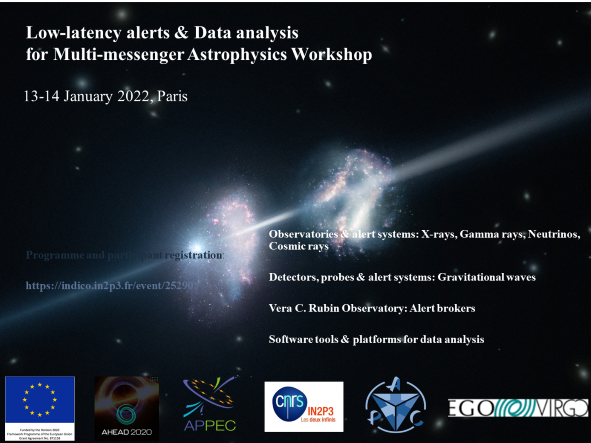
For more than a decade now, multi-messenger astrophysics has established itself as a distinct discipline. To provide new insights and understand the properties and processes of the most energetic events in the Universe, it leverages the potential of the combined analysis of multiple and complementary information sources: electromagnetic waves (or photons) from radio waves to gamma-rays, neutrinos, gravitational waves and high-energy cosmic rays.
Two major and historical events are at the foundation of this new paradigm: the supernova SN1987A and the binary neutron star merger GW170817. The former was observed through electromagnetic waves and neutrinos, while the latter in gravitational waves and a wide range of electromagnetic counterparts. Both events yielded a long list of scientific discoveries and implications that directly arise from the concomitant observation of different cosmic signals from a single source.
Thanks to the new generation of more sensitive detectors and observatories planned for the coming decade, other multi-messenger observations are expected to take place that will further expand the scope of this new astronomy.
Information access and dissemination between experiments are at the core of this science. As a consequence, interoperable cyberinfrastructures and proper communication networks will play a central role in the rapid identification of candidate events in the very large volume of data, and production of “alerts” associated with these events.
The aim of this workshop is to provide an overview of the existing and future developments from a data analysis perspective of the space-based and ground-based infrastructures, identify and discuss technical issues and foster new interactions and community building around the multi-messenger data analysis science and tools. The workshop, organized under the auspices of APPEC, is the first of a potential series if deemed useful by the community.
The roundtable sessions will foster discussions on the following
non-exhaustive list of topics:
- Coordinating European infrastructures for data analysis for space and ground-based observatories
- Research infrastructure partnerships for combination of messengers
- New analysis tools for the transient Universe, data format, sharing of results
- Efficient and scalable machine learning algorithms to identify best candidates for transients
- Big data needs (HPC, cloud computing)
- Building a community of experts for developing common libraries and tools
- EOSC and open data for observatories
- Collaboration at European level: what is the path to a common strategy?



